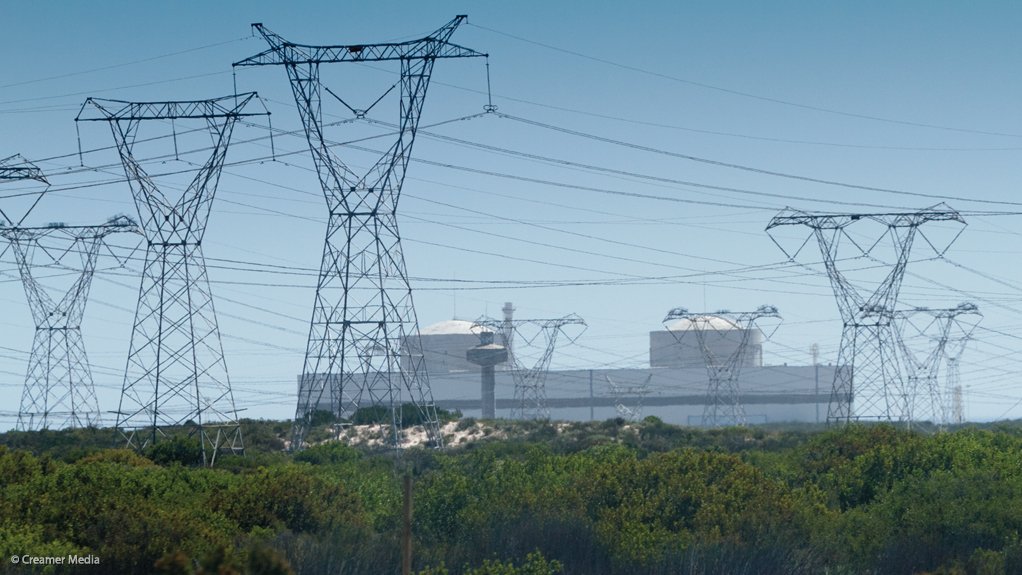Eskom’s system operator GM, Isabel Fick, does not foresee the Western Cape power grid being materially destabilised if both of Koeberg’s two nuclear reactors are out of service simultaneously later this year, owing to yet another Unit 1 outage slip.
She noted during a webinar that the two Koeberg units had been out of service simultaneously for 48 hours on April 15, without triggering major grid instability in the province, which is also supported by a 765 kV transmission network that transports electricity from the north-east of the country.
“There is quite a bit of stability in the Western Cape even without the Koeberg units and mainly due to the 765 kV backbone network that goes into that area.
“So, we don’t foresee a major issue as a result. You would need an extra contingency, as in the 765 kV line going down, before you will see a major issue there.”
That said, Fick confirmed that, from a system perspective, she would currently “love any nuclear” she could get but that adding new nuclear would be a decision for the policymaker rather than Eskom.
Her assurances regarding the loss of Koeberg generation followed confirmation by Electricity Minister Dr Kgosientsho Ramokgopa that there was a possibility that Unit 1, on an extended outage linked to a 20-year life extension plan that has been under way since December, might not be returned to service before Unit 2 was taken down for a similar outage, which would also include the replacement of its three steam generators.
The Unit 1 outage, which has been delayed several times, finally began on December 10 and was initially scheduled to continue for about 180 days and return to service in June.
By March, however, Eskom confirmed that the initially communicated return to service date was no longer achievable, but indicated that it would be reintroduced before Unit 2 was shut in September for a similar outage.
It is understood that Unit 1 may now be returned only in October, by when the Unit 2 outage will be under way leaving the loadshedding-prone South African grid without generation from either of the 920-MW-a-piece units.
“I've asked for a more detailed report, and the more we get an indication of what the issues are, the more we are getting very, very, very worried. It is something that requires urgent attention,” Ramokgopa said on June 17 ahead of a meeting with the Koeberg leadership.
Meanwhile, the Council for Scientific and Industrial Research (CSIR) Energy Centre’s Monique le Roux confirmed that modelling had been conducted to assess whether the Western Cape grid could operate stably in the absence of Koeberg.
“I can confirm that the system is able to runs stably as it is now … without Koeberg.
“Obviously, Koeberg does provide a lot of stability to the Western Cape grid and that stability could be affected by a higher penetration of variable renewable energy in future, but there are mitigation strategies that can be put in place,” Le Roux said.
She reported that the CSIR was working with Eskom to understand the possible system risks of transitioning from conventional plants, such as coal and nuclear, to variable generators, such wind and solar photovoltaic.
The research has confirmed that the displacement of conventional generators with renewable generators will lead to the erosion of system inertial energy, which slows the rate at which system frequency changes in the event of a grid disturbance.
The model has been stressed tested using various mitigation measures that would have to be introduced to address inertia erosion as conventional synchronous generations are progressively replaced with inverter-based renewables.
Possible solutions identified include the conversion of retiring generator units to synchronous condensers, as is being proposed at the decommissioned Komati site, as well as introducing fast-frequency response through battery storage systems.
However, Le Roux reported that various other options were also being assessed for increasing instantaneous reserves and deploying demand response to increase system stability.
EMAIL THIS ARTICLE SAVE THIS ARTICLE ARTICLE ENQUIRY
To subscribe email subscriptions@creamermedia.co.za or click here
To advertise email advertising@creamermedia.co.za or click here











